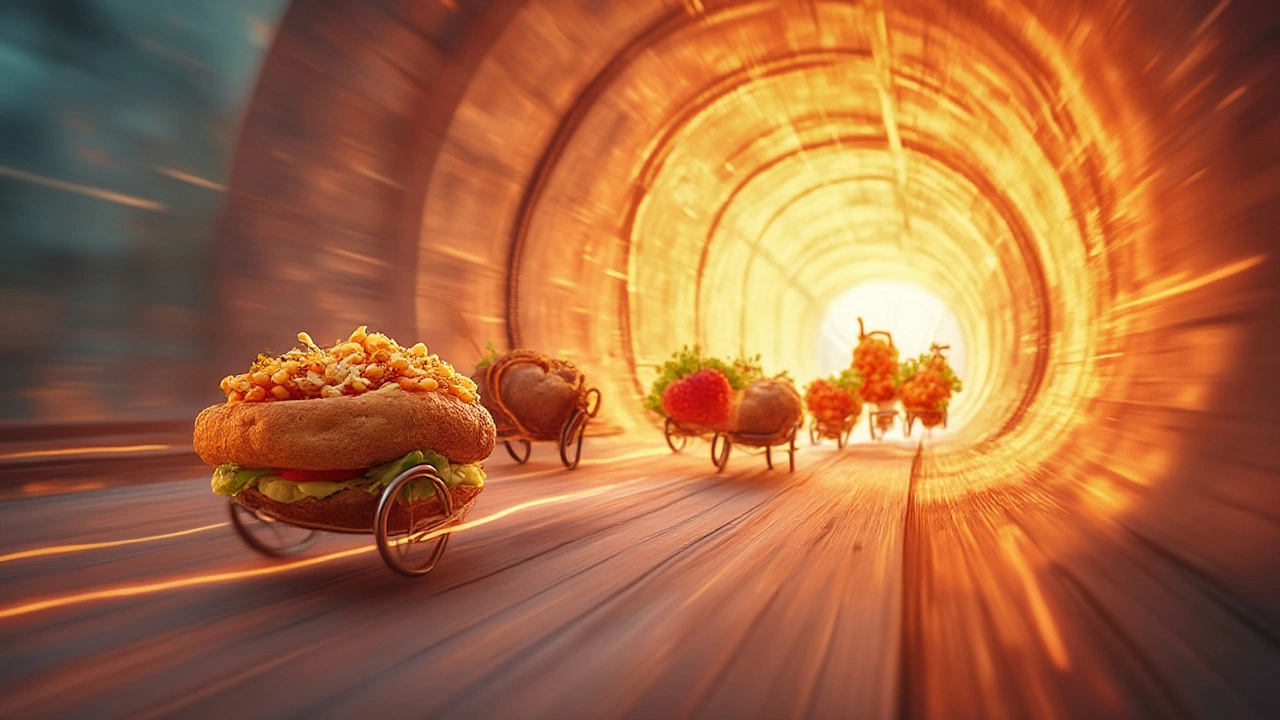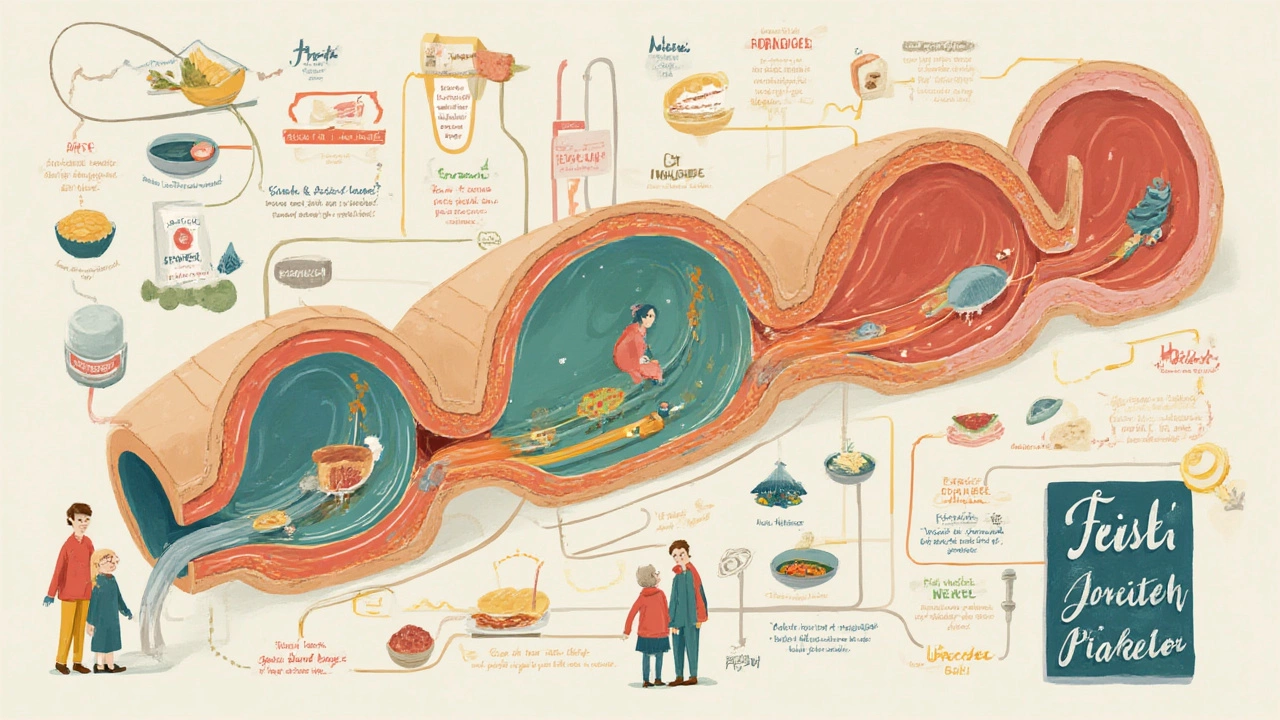Ever noticed how after some meals, you’re ravenous half an hour later, and other times, you leave the table stuffed well into the night? The answer isn’t just how much you ate—it’s about which foods made up your meal. Your stomach isn't a passive bag; it works hard to churn, mash, and break down your food into something your body can actually use. But different foods move through that maze at surprisingly different speeds, and knowing which ones zip through can make life a lot more comfortable—or miserable if you choose unwisely.
How the Stomach Handles Different Foods
Let’s start by unmasking the stomach’s real job. Food doesn’t just drop into a pit and vanish. Instead, the stomach is a muscular organ that churns incoming meals with acids and enzymes. It’s picky about letting food leave, too. The pyloric sphincter—a fancy name for the valve at the stomach’s exit—only lets chyme (that’s the soupy, half-digested mess) into the small intestine when it's ready. What determines the pace? Mostly the type of food you’re eating.
Carbohydrates barely stick around: think white bread, rice, simple cereals—these can leave your stomach in as little as 30 to 60 minutes. That’s why you might crave snacks soon after toast for breakfast versus a cheese omelette. Pure sugar washes through even faster, but as part of a bigger meal, it gets delayed. Fats, on the other hand, throw a wrench in the works. They slow stomach emptying, often keeping food churning between two and six hours. Then there are proteins—meats, eggs, beans—a bit slower than carbs, but nowhere near fat's pace, usually clearing in two to four hours.
The texture of your meal matters, too. Liquids whizz by almost in a blink. If you just guzzled an isotonic sports drink, much of it is out of your stomach in 15-20 minutes—great for rapid refueling. Thick, solid meals are another story. A classic Aussie meat pie with gravy, pastry, and cheese can loiter for hours.
Here’s where it gets interesting: mixing foods changes the game. A meal loaded with both fat and carbs—a sausage roll, for example—will keep the stomach busy longer than a simple apple. That’s why after a big holiday or party meal, you feel sluggish for ages. But scarf down a banana, and you’re ready to run in no time; bananas, melons, and most fresh fruits rank among the fastest foods through the gut.
Scientists use a metric called gastric emptying time. A 2018 study from the University of Nottingham showed that high-fat, high-protein meals—think lasagna or rich cheese sandwiches—could delay stomach emptying by up to four hours, while a wheat-based cereal with skim milk zipped through in about an hour. That’s a big difference if you’re heading for a workout or needing to sleep.
The real world evidence? Look at how athletes eat. Elite runners or swimmers here in Melbourne keep their pre-event meals super light (toast, banana, plain pasta) and skip heavy, fatty foods. They know what slows them down—literally.

Fastest and Slowest Meals: Real Data
If you’re wondering where your favorite foods land on this speed scale, you’re not alone. While every body is a bit different (yep, genetics, health, even your mood can tweak digestion), certain foods almost always hit the fast lane—or the brakes. Here’s a breakdown based on research and what gastro doctors see daily in the clinic.
Fastest Digesting Foods:
- Clear liquids (water, tea, sports drinks): Gone in about 20 minutes.
- Juicy fruits (watermelon, melons, grapes, oranges): 30–40 minutes.
- Starches without fat (plain rice, white bread, mashed potatoes): 45–60 minutes.
Next are lower-fat, moderate-protein meals—grilled fish, tofu stir-fry without oil, steamed veggies—usually out of the stomach in under two hours.
Now compare that with the slowpokes:
- Fatty meats (sausages, bacon, fried chicken): 4–6 hours.
- Creamy soups or cheesy casseroles: Can easily hang around for 3–5 hours.
- Hard cheeses, rich desserts (cheesecake): Up to 6 hours in some cases.
Fiber deserves a special mention. While fiber-rich foods like beans or whole grains are great for health, their journey is complex. Insoluble fiber speeds up gut transit further along, but in the stomach, beans can slow down emptying due to the complex proteins and carbs they pack.
It’s not all about the food—the way you eat counts. Eating huge portions forces the stomach to stretch and work harder, which slows the whole process down. Eating fast, gulping air, being stressed—all these slow gastric emptying too. So, those old school tips to chew slowly and eat mindfully aren't just for manners.
Here’s a quick look at some rough estimates of stomach emptying times, according to various types of meals, based on clinical studies:
| Type of Meal | Stomach Emptying Time (Approximate) |
|---|---|
| Clear Liquids (water, tea) | 20 min |
| Fruit (watermelon, banana) | 30–45 min |
| Plain Starches (white bread, rice) | 45–60 min |
| Lean Protein (fish, chicken breast) | 1–2 hrs |
| Mixed Low-fat Meal (chicken & veg stir fry w/out oil) | 2 hrs |
| Fatty Meats (fried chicken, bacon) | 4–6 hrs |
| Cheese, Rich Desserts | 4–6 hrs |
If you ever feel that heavy, bloated feeling after a big meal, check what was on your plate. Those sneaky fats and creams are likely the culprit.

Why It Matters: Tips for Smarter Eating
So, what do you do with this info? If you want a meal that vanishes fast from your stomach—say, you’ve got sport training, need to avoid tummy grumbles during a big work meeting, or want a good night’s sleep—pick foods from the fast-digesting end of the table. But don’t always eat for speed. Slower-digesting foods can help you feel full longer, which is great if you’re trying to lose weight or keep cravings in check.
If you’ve got sensitive digestion or things like reflux, a heavy, fatty meal will haunt you for hours. Instead, go for plain carbs and lean protein. That’s one of the reasons “plain toast and dry chicken” are the go-to hospital meal after surgery—your system just handles them so easily.
Here are some tips to tune your meals to your needs:
- Before exercise: Stick with white bread, melon, bananas, or plain rice. Skip the cheese and sausages.
- Need to stay full all morning? Add eggs, oats, or nut butter—slows things down in a good way.
- Prone to nighttime indigestion? Ditch creamy pastas or pizza for a plain grilled chicken breast and boiled potatoes, way easier to sleep on.
- Feeling gassy or bloated? Avoid eating a giant plate of beans or broccoli before a big social event.
- Want a snack that won’t leave you hungry in 30 minutes? Pair fruit with a little Greek yogurt or a handful of nuts.
That old legend about swimming right after eating causing cramps? Turns out it’s not about swimming per se, but about stuffing yourself with heavy, slow-digesting food. In most cases, if you ate light and fast-digesting, you’d probably be fine—though, listening to your body is way smarter than any rule of thumb.
Here in Melbourne, you see a lot of people eating pho, sushi, or banh mi for lunch. These meals—packed with lean meat and fast-digesting starch—get you through the meal and back to work without that 3 pm food coma. Street food culture might have cracked the code long ago.
One last thing—not all empty stomachs are created equal. Older people, those with certain digestive issues, pregnant women, and even those on some medications might have slower digestion, no matter what’s on the plate. Hydration and gentle movement (like walking after a meal) keep things on track. That nightly stroll isn’t just for fresh air—it actually helps food pass from your stomach more efficiently.
So, which meal passes fastest? The smart money is on something simple: a clear liquid or juicy fruit. If you need energy without heaviness, grab a meal digestion time winner like white toast and banana, and your stomach will thank you. Your eating habits can mean the difference between cruising through your day and dragging your feet—so, eat smart, feel better, and don’t forget to listen to what your own body tells you. Nobody knows you quite like your own gut does.

